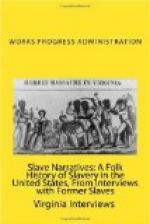“I heerd tell one time, tho’, of de hired man (he was a nigger) an’ de oberseer whuppin’ one of my cousins ’til she bled; she was jes’ sebenteen years old an’ was in de fambly way fer de fust time, an’ couldn’ work as hard as de rest. Nex’ mawnin’ afte’ dat she died. De hired man tol’ de rest if dey said anything ’bout it to de marster, he’d beat dem to death, too, so ever’body kep’ quiet an’ de marster neber knowed.
“We worked hard in de fiel’ all day, but when dark come we would all go to de Quarters an’ afte’ supper we would set ‘roun’ an’ sing an’ talk. Mos’ of de time we had good food to eat ‘cause mos’ of us had our gardens, an’ de Quarters cook would fix what we wanted if we brung it to her. Durin’ de last years ‘fo de surrender, we didn’ have much to eat tho’; an’ made out de best we could.
[HW: Religion]
“De mos’ fun we had was at our meetin’s. We had dem mos’ ever’ Sunday an’ dey lasted way into de night. De preacher I laked de bes’ was name Mathew Ewing. He was a comely nigger, black as night, an’ he sho’ could read out of his han’. He neber larned no real readin’ an’ writin’ but he sho’ knowed his Bible an’ would hol’ his han’ out an’ mek lak he was readin’ an’ preach de purtiest preachin’ you ever heered. De meetin’s last frum early in de mawnin’ ’til late at night. When dark come, de men folks would hang up a wash pot, bottom up’ards, in de little brush church-house us had, so’s it would catch de noise an’ de oberseer wouldn’ hear us singin’ an’ shoutin’. Dey didn’ min’ us meetin’ in de day time, but dey thought iffen we stayed up ha’f de night we wouldn’ work so hard de nex’ day—an’ dat was de truf.
“You should’a seen some of de niggers get ’ligion. De best way was to carry ’em to de cemetery an’ let ’em stand ober a grave. Dey would start singin’ an’ shoutin’ ‘bout sein’ fire an’ brimstone; den dey would sing some mo’ an’ look plum sanctified.
“When us had our big meetin’s, dere would allus be some darkies frum de plantations aroun’ to come. Dey would have to slip off ’cause dey marsters was afraid dey would git hitched up wid some other black boy er gal on de other plantation an’ den dey would either have to buy er sell a nigger ’fo you could git any work out of him.
“We neber knowed much bout de War, ‘cept dat we didn’ have as much to eat er wear, an’ de white men folks was all gone. Den, too, Old Miss cried a lot of de time.
[HW: Reconstruction]
“De Yankees come ‘roun’ afte’ de War an’ tol’ us we’s frea an’ we shouted an’ sang, an’ had a big celebration fer a few days. Den we got to wonderin’ ‘bout what good it did us. It didn’ feel no diffrunt; we all loved our marster an’ missus an’ stayed on wid ’em jes’ lak nothin’ had happened. De Yankees tried to git some of de men to vote, too, but not many did ’cause dey was scared of de Ku Kluxers. Dey would come at night all dressed up lak ghosts an’ scare us all. We didn’ lak de Yankees anyway. Dey wa’nt good to us; when dey lef’ we would allus sing dat leetle song what go lak dis:




